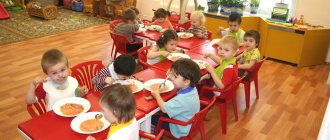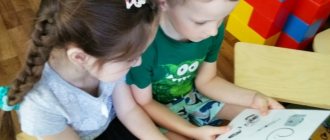Methods of labor education for preschool children
In kindergarten, the initial foundation of hard work is formed. Educators teach children to engage in activities that are beneficial to society. Training must be carried out in a playful way, since this type of activity is the leading one for preschoolers.
Children need to be taught from an early age the need to help their parents
You need to raise a child gradually, as he will have to master several stages. He will have to develop skills, be able to set goals, plan his work and achieve results.
Important! At preschool age, children have only external motivation, i.e. they need financial incentives.
At preschool educational institutions, teachers help children master the first tools of labor. The teacher also sets goals and monitors their achievement - this is good to develop through self-service skills.
The role of family traditions
The position of an adult when teaching a child work activities is helping. For example, if a baby asks to lace his shoes, then the parent does not need to sit him on a chair and do it for him. The right thing to do would be to show him how it’s done and help him cope with it himself.
It is necessary to develop social and everyday skills in the child
Nurturing hard work in preschoolers depends on various factors. Mastering simple skills begins with observing an adult. If parents often clean, wash dishes, etc., then the baby will begin to try to repeat after them.
At the age of 3, the child develops the need “I myself.” It is from this moment that you can begin training.
The relevance of the correct position of an adult
Educators can offer the brochure “Labor education in the family”; the consultation for parents contains practical advice and common mistakes. Moms and dads should systematically teach their children to do housework.
Some adults mistakenly ask a child to help only upon express request. This attitude interferes with proper teaching. Sometimes parents take an overprotective position. They do everything for the child, suppress his independence and initiative.
Close people should help the child cope with various tasks. For example, let him dress on his own and get ready for a walk.
Important! Don't expect your child to do it perfectly the first time.
Teaching children work skills begins with demonstrations of action. The parent should provide support for the slightest attempts to do something independently. For example, wipe the floor. Even if a child just rubs the dirt, initiative should be encouraged.
If an adult begins to overprotect the child, he will quickly get used to being lazy and will have no desire for personal activities.
Labor activity in the preparatory group
Consultation for parents on the topic: “Labor education of children in the family and in kindergarten.”
Author: Neznanova Svetlana Vyacheslavovna
Consultation for parents on the topic: “Labor education of children in the family and in kindergarten.”
Work
- the most important means of education, starting from preschool age, in the process the child’s personality is formed, collective relationships are formed.
The work of preschool children is the most important means of education. The entire process of raising children in kindergarten can and should be organized so that they learn to understand the benefits and necessity of work for themselves and for the team. Treating work with love and seeing joy in it is a necessary condition for the manifestation of a person’s creativity and talents.
Labor has always been the basis for human life and culture.
Hard work and the ability to work are not given by nature, but are cultivated from early childhood. Work must be creative, because it is creative work that makes a person spiritually rich.
Types of labor.
Various types of work are not the same in their pedagogical capabilities, their meaning changes at one or another age stage. If, for example, self-care has greater educational significance in younger groups - it teaches children to be independent and equips them with skills to overcome difficulties, then at the senior preschool stage this work does not require effort and becomes habitual for children.
Self-service
- this is a constant concern for the cleanliness of the body, about the order in clothes, the willingness to do everything necessary for this and to do it without demands from the outside, but from an internal need, to observe hygienic rules. It is clear that such an attitude of children towards self-care work can be achieved through painstaking, systematic work in kindergarten and family.
Self-care is the main type of work of a small child. Teaching children to dress themselves, wash themselves, eat, and put their toys away in their place develops in them independence, less dependence on an adult, self-confidence, desire and ability to overcome obstacles.
Children's work in nature.
Labor in nature is associated with expanding children's horizons, obtaining accessible knowledge, for example, about soil, planting material, labor processes, and tools. Working in nature contributes to the development of observation and curiosity in children, instills in them an interest in agricultural work and respect for the people who do it. Working in nature helps to cultivate love for it.
Manual labor
– develops children’s constructive abilities, useful practical skills and orientations, creates interest in work, readiness for it, to cope with it, the ability to assess their capabilities, the desire to do the job as best as possible (stronger, more stable, more graceful, more accurate).
In the process of work, children become familiar with the simplest technical devices, master the skills of working with certain tools, and learn to treat materials, objects of labor, and tools with care.
Through experience, children learn elementary concepts about the properties of various materials: the material undergoes various transformations, a variety of things can be made from it. Thus, while learning to make useful items from thick paper, children learn that it can be folded, cut, and glued.
The joy of work is a powerful educational force. During childhood, a child must deeply experience this noble feeling.
The richness of human relationships is spread through work. It is impossible to cultivate a love of work if the child does not feel the beauty of this relationship.
“A person needs free labor in itself for the development and maintenance of human dignity”
Working with family.
Labor is of particular importance in the process of moral education of a child. Work develops such personality qualities as responsibility, hard work, discipline, independence and initiative.
Performing certain feasible work duties helps to develop a child’s sense of responsibility, goodwill, and responsiveness. For the formation of all these qualities, the family has the most favorable conditions. Here all affairs and concerns are common. Working together with parents or other family members encourages the child to help each other, to do something for everyone. Thus, he lays the foundations of the moral qualities necessary for life in society.
How to introduce a child to work?
In a family, children constantly see what their parents are doing: cooking, cleaning the apartment, washing clothes, sewing. Observing how adults perform these everyday tasks gradually helps the child understand their importance and the parents’ attitude to work: mom came home from work tired, but has to cook dinner for everyone, dad goes to the store for groceries. It should be remembered that children's observations can be contemplative in nature. So that the example of family members becomes a guide to action for the child, adults can accompany their work with explanations. This usually attracts the attention of children, they ask questions and try to help their parents. Thus, the child is gradually attracted to joint work with adults.
It is also necessary for parents to remember the importance of familiarizing the child with their work in production, what they do and what benefits they bring to people; for example, mother is a doctor, she treats the sick; Dad is a teacher, he teaches children.
Through the work of adults, the child will be taught respect for the work of all people. The surrounding reality presents great opportunities for this. When walking with your child, you need to teach him to throw garbage only in the trash can, and also pay attention to how clean the streets are. Your child will be interested to know that a janitor keeps the streets clean. A clean street is the result of his work. The janitor gets up before everyone else and, when the children go to school for kindergarten, he has already finished his work. Buying bread. The bread factory workers worked all night, and the driver managed to bring it to the store, the bread was loaded by loaders, and the sellers put it on shelves in the sales area. Works of fiction, illustrations, and paintings will help expand a child’s understanding of the work of adults.
In the family, the child is involved in daily participation in household work.
Children's interest in work increases significantly if its usefulness to others is obvious
Instructions given to children should be interesting and attractive in the form of execution. If they are based only on orders: “Give!”, “Hold!”, “Bring!”, then this discourages the child from working. Therefore, an adult, say, doing carpentry, not only asks to bring some kind of tool, but also teaches the child how to use it.
When entrusting children with this or that task, adults must take into account their age-related capabilities. If the tasks are feasible, the preschooler completes them with interest.
In order for children to master the correct techniques for performing a particular type of work, so that they are willing to work, it is necessary to have the appropriate equipment at home.
The work of children in the family, organized by adults, brings the child closer together, contributes to the influence of the adult, but also his interests and needs. It is especially valuable if parents are able to promote in the process of work the development in children of a desire for activities that are useful for the family: to do something for their younger brother, a gift for their mother, a friend, etc.
Conclusion
Thus, work activity is one of the important factors in the education of the individual.
The main developmental function of labor is the transition from self-esteem to self-knowledge. In addition, abilities, skills and abilities are developed in the process of labor. New types of thinking are formed in work activity. As a result of collective work, the child gains skills in work, communication, and cooperation, which improves the child’s adaptation in society. comments powered by HyperComments
Practical advice
It’s not for nothing that teachers develop consultations for parents “Labor education for preschoolers.” It is this period that is very important for the formation of the first ideas about social and everyday skills.
When to start
Not only when being in a group, a child must follow the rules. At home he also runs errands and does various jobs. From an early age, he is taught to put toys in place, clean up after himself, and help his parents.
In kindergarten, teachers also develop independence, but this is not enough. Therefore, parents are also full participants in the process.
Education of hard work in preschool children takes place under the supervision of adults. They are the ones who help develop habits and skills. This process takes several years, so you need to do it from the baby’s first year.
Important! There are no uniform teaching methods, but it is worth adhering to two principles - consistency and systematicity. In this case, you will be able to achieve your goals.
How to teach a preschooler to work
In the first year of a child's life, parents gradually teach him to put toys in their places. To do this, he is shown how to put them in a box or container. This needs to be done in a playful way.
After completing the task, the child must be encouraged
Educational institutions may hold parent meetings on “Family Traditions and the Child’s Ability to Work.” All this is aimed at ensuring that adults receive practical advice on parenting.
Before starting kindergarten, children must learn to care for themselves. To do this, they are taught to wash their face, brush their teeth, comb their hair, get dressed, etc.
Important! First, the parent shows how to do it, then helps to carry out the actions.
Different methods of labor education are aimed at achieving one goal - developing the need to carry out useful activities. To do this, parents ask for help in arranging washed dishes, wiping off dust, etc.
The tasks should be age appropriate. The components of activity are goal, motive, means and result. The education process is built on the basis of them. For example, the child is told that toys need help and need to be put in their places.
A tool is something that helps to carry out an activity. The child needs to use cutlery to eat. Therefore, he will need different skills and abilities in life.
The educational potential of the labor activity of preschool children allows us to consider it useful for society. What a person will be like in the future depends on this. He must have the right attitude towards work.
A person’s success directly depends on hard work
It’s worth working with schoolchildren a little differently. From the first grade they can already be assigned different tasks. It is better to write them all down in a list that will help him remember everything.
Topics of labor education events in schools and kindergartens
Important! Developing the habit of studying also requires a special approach. Therefore, if a child is assigned to write an essay, the parent can tell him where to look for information. But don't try to do the job for him.


